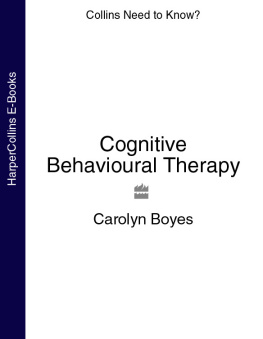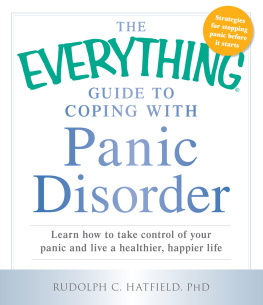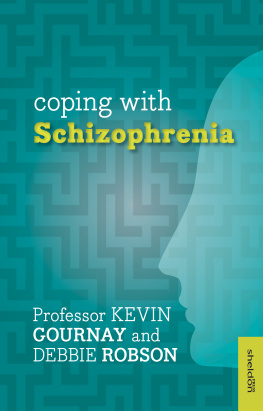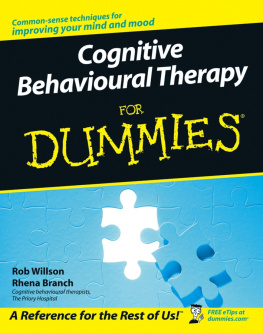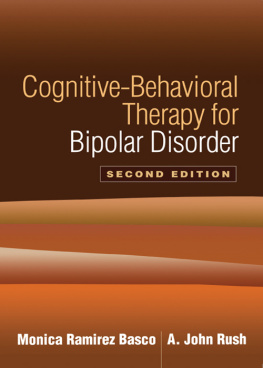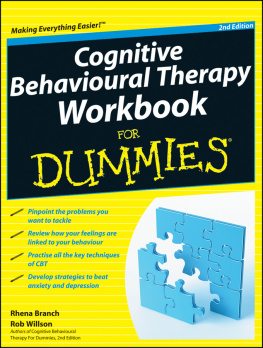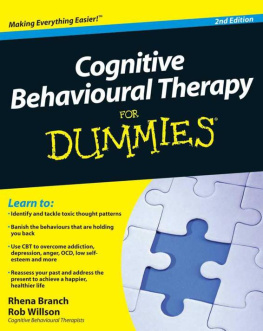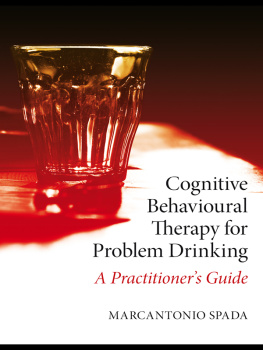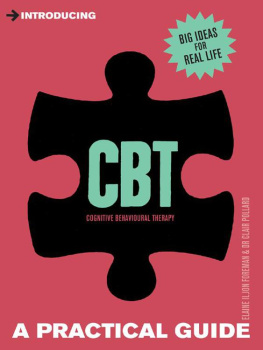Coping with
bipolar
disorder
ALSO AVAILABLE IN THE COPING WITH SERIES
Series Editor: Steven Jones, University of Lancaster
Coping with Schizophrenia:
A Guide for Patients, Families and Caregivers
Steven Jones and Peter Hayward
ISBN 9781851683444
Coping with an Anxious or Depressed Child:
A Guide for Parents
Sam Cartwright-Hatton
ISBN 9781851684823
Coping with Fears and Phobias: A Step-by-Step
Guide to Understanding and Facing your Anxieties
Warren Mansell
ISBN 9781851685141
Coping with Shyness and Social Phobia:
A Guide to Understanding and Overcoming Social Anxiety
W. Ray Crozier and Lynn E. Alden
ISBN 9781851685165
Coping with Obsessive-Compulsive Disorder:
A Step-by-Step Guide Using the Latest CBT Techniques
Jan van Niekerk
ISBN 9781851685158
TO ORDER TITLES
All the titles in this series are available direct from the publisher.
Please visit www.oneworld-publications.com to order books online.
Coping with
bipolar
disorder
A CBT-informed
guide to living with
manic depression
Steven Jones
Peter Hayward
Dominic Lam

COPING WITH BIPOLAR DISORDER
A Oneworld Book
First published by Oneworld Publications, 2002
Reprinted 2003, 2004
First published in this new edition, 2009
This ebook edition published by Oneworld Publications 2011
Copyright Steven Jones, Peter Hayward, Dominic Lam, 2002, 2009
All rights reserved
Copyright under Berne Convention
A CIP record for this title is available
from the British Library
ISBN 978 1780740119
Cover design by Mungo Designs
Typeset by Saxon Graphics Ltd, Derby, UK
Oneworld Publications
185 Banbury Road
Oxford OX2 7AR
England
Learn more about Oneworld. Join our mailing list to find out about our latest titles and special offers at:
www.oneworld-publications.com
Series foreword
This series is intended to provide clear, accessible, and practical information to individuals with a wide range of psychological disorders, as well as to their friends, relatives and interested professionals. As the causes of emotional distress can be complex, books in this series are not designed purely to detail self-treatment information. Instead, each volume sets out to offer guidance on the relevant, evidence-based psychological approaches that are available for the particular condition under discussion. Where appropriate, suggestions are also given on how to apply particular aspects of those techniques that can be incorporated into self-help approaches. Equally important, readers are offered information on which forms of therapy are likely to be beneficial, enabling sufferers to make informed decisions about treatment options with their referring clinician.
Each book also considers aspects of the disorder that are likely to be relevant to each individuals experience of receiving treatment, including the therapeutic approaches of medical professionals, the nature of diagnosis, and the myths that might surround a particular disorder. General issues that can also affect a sufferers quality of life, such as stigma, isolation, self-care and relationships are also covered in many of the volumes.
The books in this series are not intended to replace therapists, since many individuals will need a personal treatment programme from a qualified clinician. However, each title offers individually tailored strategies, devised by highly experienced practicing clinicians, predominantly based on the latest techniques of cognitive behavioural therapy, which have been shown to be extremely effective in changing the way sufferers think about themselves and their problems. In addition, titles also include a variety of practical features such as rating scales and diary sheets, helpful case studies drawn from real life, and a wide range of up-to-date resources including self-help groups, recommended reading, and useful websites. Consequently, each book provides the necessary materials for sufferers to become active participants in their own care, enabling constructive engagement with clinical professionals when needed and, when appropriate, to take independent action.
Dr Steven Jones
Series Editor
Acknowledgements
The primary inspiration for this book came through our clinical experience of working with people with a diagnosis of bipolar disorder and their relatives. We have also all been involved in clinical research into the effectiveness of psychological interventions for people with this diagnosis. We have found people with bipolar disorder to be a diverse and fascinating group whose resilience in the face of their often very substantial difficulties is humbling.
In our experience the efforts to cope of both people with bipolar disorder and those close to them are impeded by a lack of ready access to information relevant to their condition. It is therefore our hope that this book will go some way to providing people with bipolar disorder, and others who may be interested, with information on a range of issues relevant to their diagnosis as well as indicating the important role that people can play in their own treatment, both psychological and medical. Many people have offered help and advice with this manuscript, including Jenifer A. Bright, Mike Calver, Sophia Frangou, Tom Fahy, Clare Martin, Robin Forman and Carol Larkin. Their help has been invaluable and we hope that we have made good use of it. We are also very grateful to Katherine Taylor, who made many useful suggestions for improvement to this new edition.
Chapter 1
What is bipolar disorder?
Introduction
This book is intended to provide information for people who are experiencing bipolar disorder, along with their relatives, friends and other interested lay people. Bipolar disorder is the term that is now used to describe what was formerly known as manic depressive illness. The focus of this book will be on providing useful information about the nature of this illness and its treatment. This information will include both traditional treatment approaches and more recently developed psychological treatments. It is not the intention of this book to imply that people with illness should treat themselves, but rather that by having access to relevant information they can take an active and influential role in the course of their own treatment. As authors we have both clinical and research experience that attests to the usefulness of psychological approaches to bipolar disorder. We are also well aware that at present these are most effective when used in combination with more traditional forms of psychiatric treatment, in particular with appropriate forms of medication.
How common is it?
Bipolar disorder is not uncommon. Around 11.5% of the population in both Britain and the United States are expected to be suffering from bipolar disorder at any time. This translates to around one in every hundred people having a form of bipolar disorder that would be recognised by psychiatrists. This figure alone indicates that a large number of people are living with bipolar disorder and this does not take account of milder forms of mood difficulties that would not be diagnosed as bipolar disorder but could still cause significant problems for those experiencing them. This includes cyclothymic disorder, in which the individual tends to experience relatively frequent changes of mood (both elevated and depressed) but in which no single episode is so severe as to require a clinical diagnosis of mania or depression.
Next page







